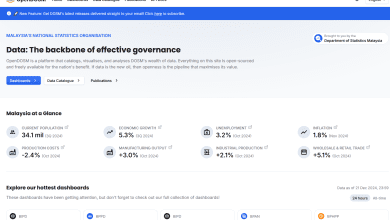

Many early childhood services are at risk of closing down as they are unable to maintain the financial commitment to their services. These include childcare services (baby-sitting), kindergartens and, more importantly, centres that conduct early intervention programmes (EIPs) for children with disabilities.
The profit margins for early childhood services, especially EIPs for children with disabilities, are small. Most tend to have limited access to cash reserves and lack the capacity to withstand any drop in revenue. Most staff at early intervention programme (EIP) centres are not paid wages proportionate to the work they do, and most centres just break even. Many wonderful individuals work here as they have a heart’s desire to support children with disabilities and their families.
Centres often depend on donations from the public to keep such vital services alive. Some centres have received assistance from the Perkeso Wage Subsidy Assistance (3 months) but this is inadequate to tide them over long term. There was an announcement of support under the National Economic Recovery Plan (PENJANA) disbursed by the Department of Social Welfare but this will not reach most EIP centres. Hence many centres have not received any financial support or fees for the last few months and some have not been able to pay their staff.
Perhaps the gravity of the situation can only come across if we describe one centre as an example of what is experienced by many in the country. During the movement control order (MCO) period, at one centre in KL, very few of the parents were able to pay fees. After the MCO, 25% of parents pulled out of the programme because they had lost their jobs or experienced pay cuts. Of those that returned when the centre reopened, 75% asked for reduction in fees; some could not pay at all. Hence the centre has had to implement pay cuts for the staff. They are now desperately seeking donations to enable the centre to survive. Failing which all these children with disabilities will lose services and the staff their jobs.
Attempts have been made by the National Early Childhood Intervention Council (NECIC), in partnership with UNICEF, to provide early intervention services online. While useful, there are many challenges for the provider and end-user of such services. It cannot, in the short term, replace face-to-face services that are required to engage children with disabilities.
We are concerned that many children have lost access to early intervention services, and some will have lost the progress they had made. There is also a serious concern that ‘new’ children with disabilities are undetected and left without help or critical early intervention. Note that many of these children will have difficulties integrating into conventional pre-school service without the prior training provided by EIP centres.
Children with disabilities are a marginalised group and struggle to gain societal acceptance (inclusion) and obtain adequate services and intervention. Even before COVID-19, EIP services in Malaysia were grossly inadequate and insufficient to meet the needs of the 10-15% of all children who have disabilities; especially so in rural communities and for poor households.
COVID-19 has made this struggle even harder. Our fear is not merely a disruption of early intervention services for children, but a loss of existing services. The Government must recognise that some EIP centres will close down, unless they receive financial support. We also must not lose the existing EIP workers and staff who are already trained and are critical to keep these services running.
Remember that the cost of running these services will go up as, due to COVID-19, there will be a need to have smaller child-to-staff ratios, hence extending hours for staff and decreasing enrolment. Funding is also required for sanitising practices and staff use of masks and personal protective equipment (especially for occupational therapists and physiotherapists who need physical contact to conduct the therapy).
It is vital that we restart and re-establish these services as soon as possible. However, many parents may not be able to bring their children, as they may no longer be able to afford the services (even though the fees are reasonable) due to loss of their jobs or concerns for the economic future in the face of the COVID-19 pandemic. There is a need for proactive steps to be taken by the authorities to support families and EIP centres, and offer real solutions to meet financial needs. We must sustain early intervention services, as they help to reduce the inequalities in society.
We recommend the following actions and appeal to each of the key actors below to join hands for Malaysia’s children with disabilities:
- The Federal Government, in partnership with State Governments:
Provide immediate financial support to meet half the wages of all staff at all EIP centres in the country for the next 12 to 24 months. This will allow the centres to decrease their fees (some don’t charge fees), allow more families to access the services and keep EIP workers employed.
- Corporate Bodies and Institutions:
Recognise this dire need and use corporate social responsibility funds to support EIP centres.
- The People of Malaysia, especially those with some financial reserves:
Kindly consider ‘adopting’ an EIP centre in your local area and make regular financial contributions. People in the local community can come together to keep EIP services alive and available to families.
We hope that when financial support is provided, it is disbursed evenly and fairly. In the past, and even now, aid tends to only be channelled to centres that are affiliated with State Governments or the Program Pemulihan Dalam Komuniti under the umbrella of the Department of Social Welfare. The bulk of the early intervention work is done by non-governmental organisations (NGOs) and they are often ignored for funding.
It is important to note that, if EIP services provided by NGOs do not survive and NGO-run EIP centres have to close their premises, this huge responsibility will fall on the Government. It is the rightful duty of the Government to provide early intervention services to all children with disabilities, but until now it is civil society that has responded to this need, especially in urban settings.
Our society is defined not by its economic progress or achievements, but how it cares for its children, especially those that are disadvantaged. We look to all of us in these challenging times to be there for children with disabilities, ensure continuity of services that they need and support their families.
Thank you.
The letter is signed by the following individuals and organisations:
Individuals
- Dato’ Dr Amar-Singh HSS, Consultant Paediatrician and Advisor National Early Childhood Intervention Council, amarhss@gmail.com
- Dr Wong Woan Yiing, Consultant Paediatrician and President National Early Childhood Intervention Council, drwyiing@gmail.com
- Ng Lai Thin, Project Officer, National Early Childhood Intervention Council, laithin.ng@gmail.com
- Kong Lan Lee, Persatuan Kanak-Kanak Istimewa Kajang Selangor, pkik507@gmail.com
- Aimee Chan, Honorary Secretary, Persatuan Kebajikan Sri Eden Selangor dan Kuala, Lumpur srieden@ymail.com
- Dr Tan Liok Ee, President, BOLD for Special Needs Penang
- Feilina Feisol, Chairperson of National Autism Society of Malaysia, feilina.feisol@gmail.com
- Khor Ai-Na. CEO Asia Community Service, acspenang@gmail.com
- San Yuenwah, Senior Advisor, Disability Inclusion, United Nations ESCAP, durianspirito@gmail.com
- Nur Izzat Nasir, Persatuan Kanak-Kanak Istimewa Kajang Selangor
- Jenisiah Supian, Persatuan Kanak-Kanak Istimewa Kajang Selangor
- Nur Syaimaa Hamdan, Persatuan Kanak-Kanak Istimewa Kajang Selangor
- Manyi Rumanyi, Persatuan Kanak-Kanak Istimewa Kajang Selangor
- Visalachai Perutchethman, Persatuan Kanak-Kanak Istimewa Kajang Selangor
- Vikneswari Thamil Thilagam, Persatuan Kanak-Kanak Istimewa Kajang Selangor
- David Chiang, General Manager, St Nicholas Home Penang, gm@snh.org.my
- Bathmavathi Krishnan, bathma23@gmail.com
- Lim Suat Wei, Speech-language therapist, suatwei_lim@yahoo.com
- Noora Mat Rifin, President, Persatuan Kebajikan Anak-Anak Istimewa Selangor (Orkids)
- Doris Catherine, Principal, Persatuan Kebajikan Anak-Anak Istimewa Selangor (Orkids)
- Christine Foo Sau Ngan
- Eunice Tan Kindy JB Support EIC: The Seed Childcare Centre
- Annie Tan Cheng Choo, Persatuan Kanak-Kanak Istimewa Kajang Selangor
- Ho Voon Fei, Persatuan Kanak-Kanak Istimewa Kajang Selangor
Organisations
- National Early Childhood Intervention Council
- Persatuan Kanak-Kanak Istimewa Kajang Selangor (PKIK)
- National Autism Society of Malaysia
- Kiwanis Down Syndrome Foundation
- SPICES Early Intervention Centre
- Persatuan WeCareJourney
- Ohana Association Ipoh Perak
- Yayasan Orang Buta Malaysia / Malaysian Foundation For The Blind
- Pertubuhan Perkhidmatan Intervensi Awal, Batu Pahat
- St Nicholas Home Penang
- New Horizons Society, Ipoh, Perak
- Persatuan Pemulihan Sultan Azlan Shah, Ipoh
- Wings Melaka
- Persatuan CHILD Sabah
- Persatuan Kebajikan Anak-Anak Istimewa Selangor (Orkids)
- Asia Community Service
- Pertubuhan Pusat Penyayang Langkah Awal, KL
- Spark Child Centre
- Association of the Network for the Needs of Children with Disability (Perak)


